By Rick Vacek
GCU News Bureau
The scene at Grand Canyon University on Wednesday was not unlike what you’d see outside a major sports venue. A throng of fans crowded around their hero, seeking autographs and taking selfies.
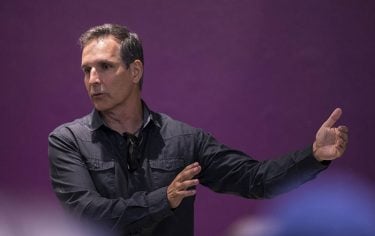
And while Todd McFarlane is an athlete and has played a major role in one facet of the sports world (more about that later), he’s more famous for something completely different: He’s an artist, writer and entrepreneur who has parlayed his ability to create comic books, such as Spider-Man and Spawn, into leading the most successful independent publishing company in the industry.
He was on campus to speak to Colangelo College of Business students, and the huge crowd that turned out made it clear that he certainly is a household name in their households. That gave him the cachet to talk to them in a lively and street-wise fashion about how to go about building and sustaining a career.
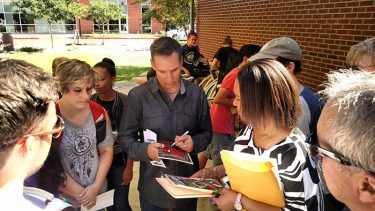
If it had been a comic book, McFarlane’s talk would have contained one panel after another with a catchy lead-in and a smart conclusion. He spoke from the heart with no notes, with a superhero passion that made the simplest point entertaining.
Panel 1: The importance of hard work
McFarlane didn’t mince words. If you want to be more skilled, you need to work hard at it. He said he spent “thousands of hours” drawing as a youngster.
“Who gets better at anything if you don’t do it?” he said, adding that if you did nothing but draw a picture of your hand for a week straight, “your drawings on Sunday would be better than on Monday.”
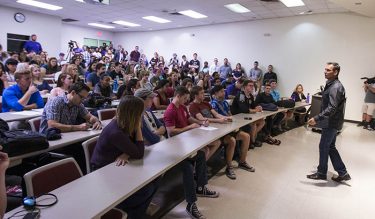
Panel 2: When opportunity knocks, answer the door
McFarlane isn’t averse to taking things that are free, such as the baseball scholarship he used to attend college. “I would go to my enemy’s house and eat his food if it was free,” he said.
But the flip side of that is finding ways to get in the door yourself, and McFarlane told of how he’d make 40 copies of each of his drawings and send them to 40 different editors. He was convinced he’d get a chance if he could just get someone to notice, and, looking back, he realizes now that he had a vastly inflated idea of his ability at the time.
“There’s a fine line between tenacity and stick-to-it-iveness and delusional,” he said. “I was delusional. Do yourself a favor for the rest of your life — lower the bar.”
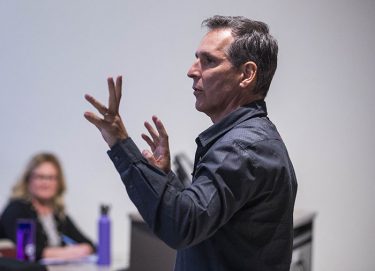
Panel 3: Timing is everything
When McFarlane did get a chance, it wasn’t because someone noticed how great his drawings were. It was because a man who was doing a book passed away, and the company needed a quick replacement.
Once he got the gig, he learned one thing quickly: “You have to get it in on time. I started showing them I could meet a deadline, and that was more than 50 percent of the job.”
And then when got established, he took the Spider-Man opportunity even though his editors counseled against it. “It’s a wreck,” they told him. But that was exactly why he took it — he had a chance to save the day and look good doing it.
“You want to look smart? Hang around with dumb people,” he said. “And when things go right, always act like it was intentional. Act like you knew what you were doing.”
Panel 4: Don’t try to reinvent the wheel — just make it better
McFarlane likened what he does to how Steve Jobs revolutionized the computer.
“I don’t believe I’m doing anything original,” he said. “What I’m good at is making things better. It doesn’t have to be all new. It just has to be five percent, eight percent different.”
When he took six other Marvel Comics employees with him and started Todd McFarlane Productions, he used his competitiveness and determination to make it work. He considers himself a modern-day Braveheart.
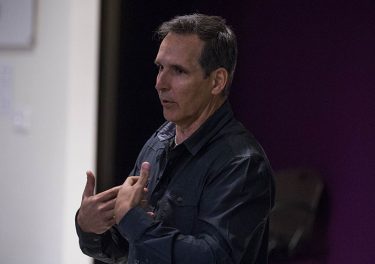
“Business is a language,” he said. “Was I good when I started? No. But I got better.”
Panel 5: The value of street cred
McFarlane’s name might ring a bell among hard-core sports fans: He’s the guy who paid $3 million for the ball that Mark McGwire hit for his 70th home run (then the Major League Baseball single-season record) in 1998.
But McFarlane didn’t stop there. He has a number of other famous home run balls, including the one used to set the current record — Barry Bonds’ 73rd in 2001.
Why would he pay that kind of money for a three-dollar baseball? Simple. He has made much more thanks to his largesse.
“I wanted to start drawing sports figures, but they wouldn’t let me in. I needed street cred,” he said.
The simple act of buying a baseball exposed his fanaticism to the four major sports leagues (football, basketball and hockey in addition to baseball), and he estimates that the deals he was able to strike with them are worth more than $20 million.
“You can’t put certain things on a spreadsheet,” he said. “It’s just gut.”
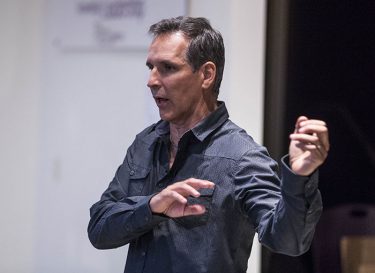
McFarlane lives out his passion for baseball in another way. Right after his talk Wednesday, he had to go play center field for his team in the MSBL MABL World Series, which brings together older players from all over the country (there even is an over-70 division) for a week of reliving their youth. The Boys of Summer get to be the Boys of October as the December of their lives nears.
He’s still a boy at heart and is passionate about the potential of today’s youth. “I’m amazed by how brilliant you are,” he told the students, and he urged them to respect their elders but realize that they, too, once made young mistakes.
“From the caveman days, youth was always considered irresponsible,” he said. “Don’t buy into it.”
A better approach, in his opinion, is to never complain about things you can change. McFarlane joked that the most important advice he got as a child was, “Only you can prevent forest fires.” Translation: It’s on you to make your life work.
“When you are bellyaching, ask yourself, ‘How much control do I have over this?’” he said. “Pick a goal, and everything else is white noise. Just pick one, be a dog and gnaw on it.”
The students showed they can take the initiative just by getting McFarlane to GCU in the first place. How it came about: One of the students, Daulton Hopkins, has a cousin who is friends with McFarlane's son, and the Business Management Club — led by Nick Gribbin, Nicole Giles, Zachary Argenbright and Ricky Morse — took it from there.
The very first thing McFarlane told the students Wednesday was, “I can take anybody in this class and turn you into a functional artist.” But he did much more — he gave them functional life and business lessons. They drew a lot more from that.
Contact Rick Vacek at (602) 639-8203 or [email protected].









































































